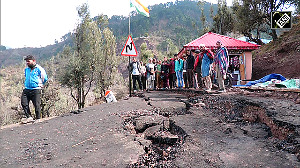India and Indian Americans have no significant footprint in American politics, according to Dr John J Hamre, president and CEO of the American Centre for Strategic and International Studies.
Addressing a roundtable conference in New Delhi, Dr Hamre said that unless there is a 'catastrophic development', India would not figure prominently in the domestic politics of the United States.
"It [India] never had a large footprint in the US, even though it has a large community. It does not figure prominently in the electoral scene," Dr Hamre said, adding that there was a significant improvement in Indo-US relations from the days when he was the deputy secretary of defence from 1997 to 1999.
The issues that concern both countries presently relate to the international security associated with terrorism, the situation in the Middle East and the situation in Pakistan, he said.
"My sense is that you will not find much voice to these issues through the electorate," Dr Hamre said. The Republicans have no interest in creating controversies, while the Democrats do not see many votes in kicking up these issues, he said.
Dr Hamre said there may not be any dramatic impact of the Republican control over the administration on Indo-US relations. He, however, said the administration understood India's concerns and was working with India in improving bilateral ties.
He said there were serious concerns about the state of Pakistan's politics and General Pervez Musharraf's regime and the 'radicalisation of politics' in Pakistan is a fear that persists. "If they [fundamentalists] were to gain control of the government and nuclear weapons were to be in their control; that is a very bad situation," Dr Hamre added.
The United States needs to engage the Muslim societies on a long-term basis, while dealing with the threat of terrorism in the short term and in a tough way.
He said the American involvement with the Muslims countries should be in the line of the US involvment of over 25 years in South America, where several democracies have emerged during the period along with improvement in economic situation.
Analysing the American political scene, Dr Hamre said there were several significant changes that had taken place over the past couple of decades.
He said the last 25 years witnessed significant decline in the tenure of Congressmen. Only 25 per cent of the present members are from the period of presidency of Bill Clinton, he said.
"The general phenomenon that you see in political Washington is the emergence of a professional political class that now governs the Congress," he said. It was common in 60s and 70s for people who were successful in their careers -- lawyers, businessmen, doctors -- to enter politics and serve longer, he said.
Dr Hamre, a former deputy secretary of defence, said in the traditional American system of the past, while the younger elected representatives spent more time in their districts trying to cultivate the constituency, the older ones focused on national issues.
Decline of the structures of seniority that tend to provide a national focus to politics, is very significant, he said.
Another significant phenomenon, he said, was the "transition in the administration of politics."
In the past, an average campaign for the House of Representatives would cost around $100,000, but now people spend two or three million dollars.
"This is for a job that pays $143,000 a year," he remarked. What has caused this development is the emergence of a "full professional class of people to run elections," he said.
"Now there is a large industry of people who make a good living of elections in Washington," he said. There are image consultants, opposition research firms, polling houses etc that constitute the industry. As a consequence of this, members of the Congress have to spend a very large amount of their time raising money.
How does this large industry make a living when there are no elections? This industry "generates issues," Dr Hamre said.
"The third phenomenon is the emergence of a new powerful triangle of forces in the American politics. It is the triangle consisting NGOs-Congress and the 24-hour media. "All of them are in the business of creating news for each other," he said.
Dr Hamre said a typical pattern is when an NGO wants to raise an issue, it gets hold of a Congressman, who wants it to get televised and to be on air as much as possible.
All these factors including the election industry, the triangle of media-NGO-Congressmen, new breed of professional politicians, the decline of seniority etc have come together to make Washington an island separated from the rest of America, Dr Hamre said.






 © 2025
© 2025